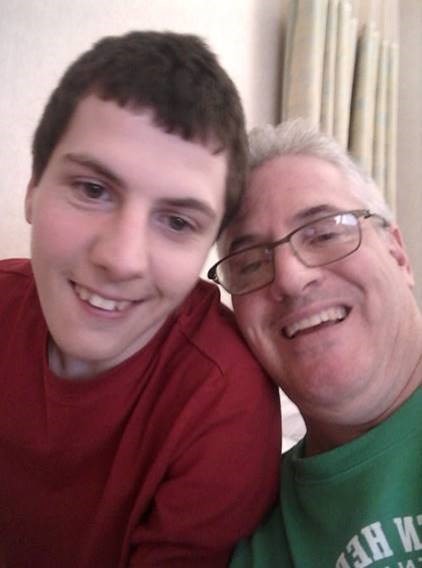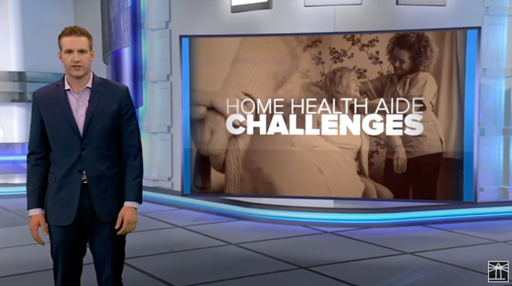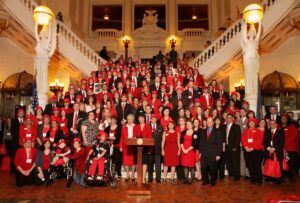In honor of Autism Awareness Month, Hearts for Home Care is celebrating those living with Autism Spectrum Disorder and raising awareness on the issues they face every day.

Grant Williams is an active and intellectually curious 26-year-old living with autism, cerebral palsy, and was born with a Traumatic Brain Injury (TBI). However, none of those diagnoses slow him down! “Grant isn’t a geriatric—he is energetic and needs to be able to go outside and engage in his environment daily. But he can’t do it alone—his cognitive and communication skills, plus his balance and coordination, prevent him from being fully independent,” Grant’s father, Bob Williams says. That’s where Grant’s home health aides come to his assistance.
Grant is part of the New Jersey Personal Care Assistant (PCA) program – a state-funded program that allows qualifying adults and seniors who may otherwise be relegated to full-time facility care (i.e. nursing home), to remain in their communities as independently as possible with assistance from home health aides (HHAs). This program assists individuals living with physical and developmental disabilities with daily activities like dressing, bathing, walking, and tasks that would otherwise be too difficult or too dangerous for the individual to perform alone. The PCA program has been a lifeline for the William’s family for the past five years and since COVID-19 hit and shut down Grant’s full-day program, care at home became even more vital to their family.

Bob also has his own permanent disability, and Grant’s HHA care was especially critical after Bob’s invasive back surgery all but incapacitated him in December. “Grant is a big guy — he’s about 5’11 and 175 pounds, so I can’t manage him with my own health issues, plus his,” says Bob. However, finding a home health aide for those who are qualified for the PCA program and authorized by their doctors for home health aide care still isn’t easy. Grant has had many aides leave for other industries and settings. Bob has seen a revolving door of aides and understands why it is so difficult for them to stay in the industry, even if they love what they do: “Aides who love their work tend to leave the industry to receive a higher education degree, or to find work in other settings like hospitals or nursing homes. At the end of the day, they can’t make fair wages in the home care field,” says Bob.
Bob has been an avid advocate for Grant throughout his life, ensuring he has the best care and opportunities possible. However, this past year Bob has jumped through hoops to ensure the safety of his son and those taking care of him. When his treasured aide Grace was having difficulty getting to and from Grant’s parents’ homes from her hometown of Camden due to public transportation issues stemming from COVID, Bob took it upon himself to drive Grace to and from her shifts. Now, Grace, like many of Grant’s former aides, has been reassigned to a new client closer to her home.
“It’s a revolving door of aides—and Grant’s ability to continue to learn and habilitate is affected. The workforce is thinning out—and COVID is making it more difficult for people to enter the home healthcare industry because of the dangers of the virus and the unsustainability of low wages in the field.”



Grant and Bob were recently featured in a Scripps Network piece highlighting these exact issues that have plagued state-funded home health programs for years and have only been exacerbated due to COVID-19.
Bob continues to go above and beyond to advocate for his son in hopes that New Jersey’s governor and legislature will consider expanding access to home health care and services designed specifically for autistic and other developmentally delayed individuals. The state’s PCA program and many other home and community-based services (HCBS) are fully funded by the state. And—as the state population continues to age and as more individuals and the government see the health, safety, and cost-savings benefits of home care—it is important for state governments to ensure that the workforce is sufficient to allow residents and their families the care they need to stay safe in their homes, and as independent as possible within their communities.
Advocacy Matters!
At Hearts for Home Care, we help those that care about home care by enabling you to get involved at the capacity in which you’re able to do so. Email us at [email protected] or follow us on Facebook.com/Hearts4HomeCare in order to learn more about the home care advocacy community and find opportunities to get involved.







